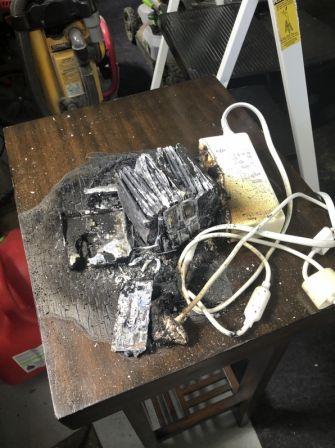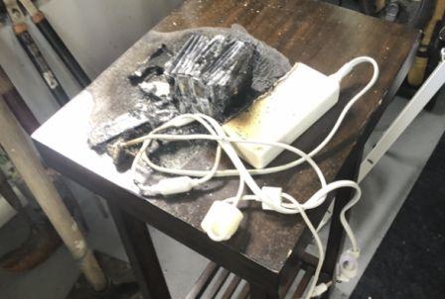How to Prevent Fires and Protect Your Home from Fire Damage
Lithium-ion batteries are widely used in many everyday devices, from smartphones to power tools. While these batteries are efficient and convenient, they can also be a major fire hazard if improperly handled. Fires caused by lithium-ion batteries can result in serious fire damage, which can require extensive restoration. In this article, we’ll explain why these batteries can cause fires, the devices that commonly use them, and how to prevent fire damage in your home.
Common Devices That Use Lithium-Ion Batteries
Lithium-ion batteries are found in many of the devices we use every day, such as:
- Smartphones and Tablets: These are among the most common devices that rely on lithium-ion batteries.
- Laptops: Modern laptops use these batteries for portability and long-lasting power.
- Power Tools: Many cordless tools, such as drills and saws, use lithium-ion batteries.
- E-Bikes and Scooters: As electric transportation grows in popularity, these vehicles have become a significant source of lithium-ion battery usage.
- Smart Home Devices: Security cameras and smart doorbells also rely on these batteries.
These devices are convenient, but improper use can lead to battery failure and fire, resulting in costly fire damage that requires professional restoration.
Why Do Lithium-Ion Batteries Cause Fires?
Lithium-ion batteries are popular because they store a large amount of energy in a compact space. However, this extreme energy also makes them vulnerable to overheating. Fires occur when the battery overheats or is overcharged. This can lead to an explosion or fire, causing serious fire damage to your property.
Some of the most common fire causes include:
- Overcharging: When a battery is charged beyond its capacity, it can overheat, causing a fire.
- Short-Circuiting: If the battery’s internal components are damaged or compromised, a short circuit can cause the battery to ignite.
- Physical Damage: Dropping or puncturing the battery can damage the internal cells, creating the conditions for a fire.
Understanding these risks is the first step in preventing fire damage and the need for fire damage restoration.
Common Mistakes That Cause Lithium-Ion Battery Fires
There are several common mistakes people make when using lithium-ion batteries that can increase the risk of fire damage:
- Overcharging Devices: Leaving devices plugged in for extended periods, especially overnight, can lead to overheating. This overheating can result in fire damage to the device and the surrounding area.
- Using Damaged Batteries: If a battery is visibly swollen, leaking, or discolored, it’s a serious fire hazard. Continuing to use such a battery can result in significant smoke damage to your home.
- Improper Storage: Storing batteries in hot or humid environments increases the likelihood of overheating, which can lead to a fire.
- Mixing Battery Types: Using incompatible or counterfeit batteries in devices can lead to malfunctions and overheating, increasing the risk of fire damage.
- Using Cheap Chargers: Low-quality chargers that don’t meet safety standards can cause overcharging and electrical shorts.
These common mistakes not only put your devices at risk but also increase the potential for fire damage to your home.
How to Prevent Lithium-Ion Battery Fires
Preventing fires caused by lithium-ion batteries can save you from the potential devastation of fire damage and the need for fire damage restoration. Here are some tips to help reduce the risk:
- Charge Devices Responsibly: Avoid overcharging your devices, especially overnight. Unplug devices once they’re fully charged to prevent overheating.
- Use Approved Chargers: Always use chargers that are recommended by the device manufacturer to reduce the risk of fire.
- Inspect Batteries Regularly: Routinely check your devices for signs of battery damage, such as swelling or discoloration. Replace damaged batteries immediately to prevent fire damage.
- Store Batteries Safely: Store batteries in cool, dry places, away from direct sunlight or heat sources to prevent overheating.
- Dispose of Batteries Properly: Never throw old or damaged batteries in the trash. Contact your local recycling center for proper disposal.
ServiceMaster Dynamic Cleaning: Fire Damage Restoration from Lithium-Ion Battery Fires
At ServiceMaster Dynamic Cleaning, we have responded to multiple fire incidents caused by lithium-ion batteries. In one case, a drone battery that was charging overnight caught fire in a homeowner’s basement. The fire caused extensive damage to the basement and spread to nearby rooms. Our fire damage restoration experts were called in to assess the damage, clean up the soot, and remove the lingering smoke odor from the home.

This incident highlights how quickly a lithium-ion battery fire can escalate, causing significant fire damage that requires professional restoration.
Smart devices and their lithium-ion batteries are an essential part of modern life, but they come with risks that can lead to fire damage if not properly managed. By following safety guidelines, you can reduce the chances of a lithium-ion battery fire in your home. However, if a fire does occur, it’s crucial to address the resulting fire damage as quickly as possible. ServiceMaster Dynamic Cleaning specializes in fire damage restoration, helping homeowners recover from fires and return their homes to a safe and livable condition. By staying informed and taking preventative measures, you can help keep your home safe from fire damage caused by lithium-ion batteries.


